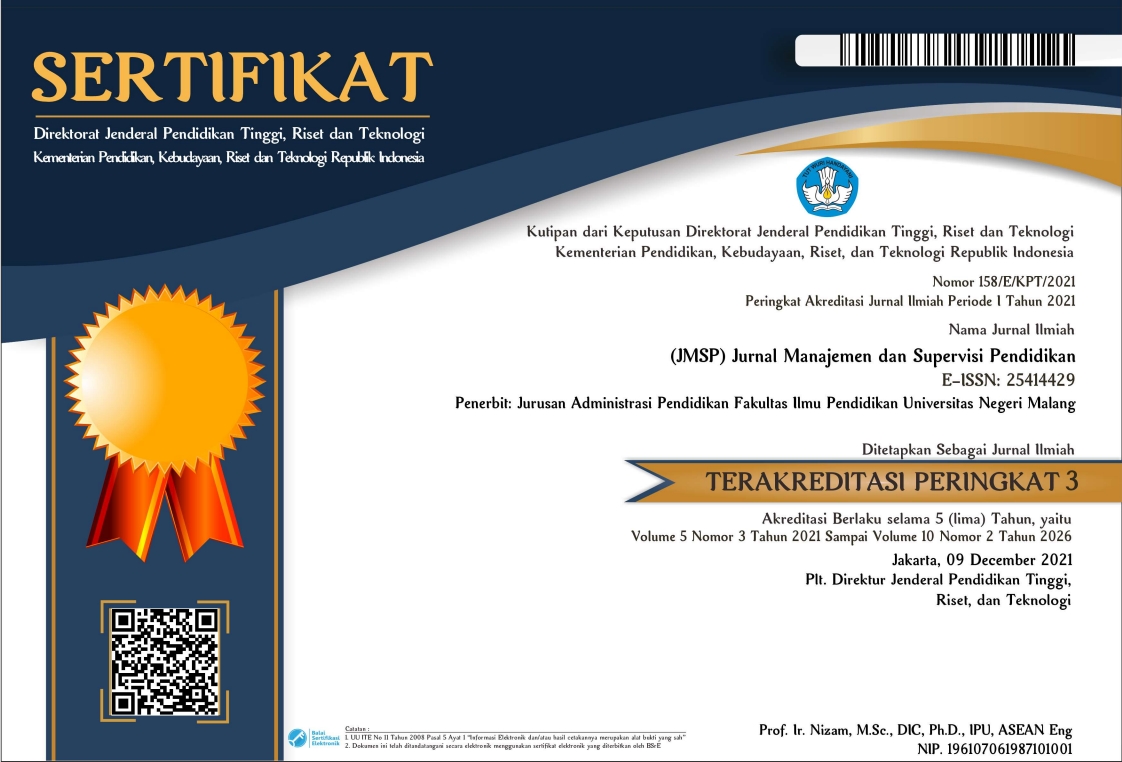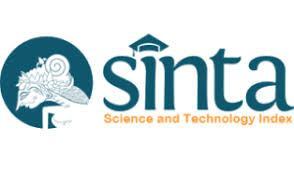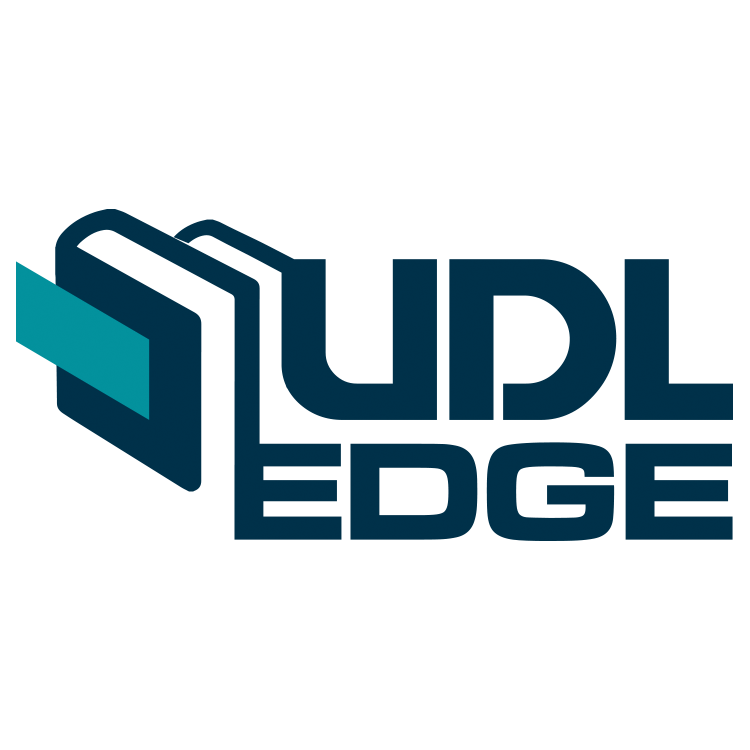INTERNALISASI NILAI-NILAI RELIGIUS PADA KETERAMPILAN MANAJERIAL KEPALA SEKOLAH
Abstract
Abstract: The purpose of this study was to determine (1) the process of internalizing religious values in the principals' conceptual skills, (2) the process of internalizing religious values in the technical skills of principals, and (3) the process of internalizing religious values in the interpersonal skills of principals at SDIT Baitul Izzah and SDI Plus Baitul Ikhlas Nganjuk. The approach used in this research is qualitative with a multi-site study approach. Data obtained through interviews with the principal as key informants, teachers, committees, and foundations. Data was collected from two sites in the form of structured and unstructured interviews, participatory observation, and document studies. Data sourced from field notes, documents, and interview transcripts that were reduced were then analyzed for validity and credibility tests using triangulation techniques. The results of the study include (1) internalization of religious values in the aspect of the principal's conceptual skills, (2) internalization of religious values in the technical aspects of the principal, (3) internalization of religious values in the interpersonal aspects of the principal's personal skills.
Abstrak: Tujuan penelitian ini untuk mengetahui (1) proses internalisasi nilai-nilai religius dalam keterampilan konseptual kepala sekolah, (2) proses internalisasi nilai-nilai religius dalam keterampilan teknis kepala sekolah, dan (3) proses internalisasi nilai-nilai religius dalam keterampilan antar pribadi kepala sekolah di SDIT Baitul Izzah dan SDI Plus Baitul Ikhlas Nganjuk. Pendekatan yang digunakan dalam penelitian ini adalah kualitatif dengan pendekatan studi multi situs. Data diperoleh melalui wawancara dengan kepala sekolah selaku informan kunci, guru, komite, serta yayasan. Data dikumpulkan dari dua situs dalam bentuk wawancara terstruktur dan tidak terstruktur, observasi partisipatif, dan studi dokumen. Data bersumber pada catatan lapangan, dokumen, dan transkrip wawancara yang direduksi kemudian dianalisis uji validitas dan kredibilitas dengan teknik trianggulasi. Hasil penelitian antara lain (1) internalisasi nilai religius pada aspek keterampilan konseptual kepala sekolah, (2) internalisasi nilai religius pada aspek keterampilan teknis kepala sekolah, dan (3) internalisasi nilai religius pada aspek keterampilan antar pribadi kepala sekolah.
Keywords
Full Text:
PDFReferences
Aldosari, dkk. (2016). Content Analysis of Science Book for Upper Primary Stage In Jordan and Intermediate Stage In Saudi Arabia From An Islamic Perspective: Analytical Comparative Study. Journal of Education and Practice, 7(7).
Arifin, I., Juharyanto, Mustiningsih, & Taufiq, A. (2018). Islamic Crash Course as a Leadership Strategy of School Principals in Strengthening School Organizational Culture. SAGE Open, 8(3). https://doi.org/https://doi. org/10.1177/2158244018799849
Busyairi, M. (2017). Education Unit Tranformation for Maintain Its Existence In Islamic Boarding School Muti Case Study on Tebuireng Boarding School, Gading Islamic Boarding School, and Sidogiri Islamic Boarding School. Journal of Education and Practice, 8(7).
Daradjat, Z. (2005). Ilmu Jiwa Agama. Jakarta: Bulan Bintang.
Fatmawati, R. (2016). Internalisasi Nilai-Nilai Pendidikan Agama Islam Melalui Sistem Full Day School Anak Usia Dini Di TK IT Nurul Islam Yogyakarta. UIN Sunan Kalijaga Yogyakarta.
Hadi, J. P. (2016). Internalisasi Nilai Agama. UIN Malang.
I Made Artha Wibawa, Eka Afnan Troena, Armanu, NoermijatiLumpkin, A. (2014). The Role of Organizational Culture on Spiritual Leadership, Human Capital, and Employee Loyalty. European Journal of Business and Managemen, 6(21), 196–205. https://doi.org/https://doi.org/1 0.1080/00131725.2013.878420.
Indra. (2012). Internalisasi Nilai-Nilai Agama Islam Dalam Membentuk Siswa Berkarakter Mulia Di SMA Negeri 15 Binaan Nenggeri Antara Takengon Aceh Tengah. UIN Maulana Malik Ibrahim Malang.
Kaelani. (2000). Islam dan Aspek-Aspek Kemasyarakatan. Jakarta: Bumi Aksara.
Mahmud, M. (2017). Internalisasi Nilai-Nilai Karakter Dalam Meningkatkan Kompetensi Kepribadian Guru Di Sekolah Menengah Pertama Islam Terpadu (SMPIT) Al-Hidayah Sumenep. UIN Maulana Malik Ibrahim Malang.
Pasathang, S., Tesaputa, K., & Sataphonwong, P. (2016). Teachers’ Performance Motivation System in Thai Primary Schools. International Education Studies, 9(7), 119. https://doi.org/10.5539/ies.v9n7p119
Purba, D. E., & Seniati, A. N. L. (2018). PENGARUH KEPRIBADIAN DAN KOMITMEN ORGANISASI TERHADAP ORGANIZATIONAL CITIZENZHIP BEHAVIOR. Makara Human Behavior Studies in Asia. https://doi.org/10.7454/mssh.v8i3.98
RadarMalang.ID. (2018). . Minat Orang Tua Sekolahkan Anak Berbasis Islam Tinggi. 2 Februari 2018. Retrieved from https://radarmalang.jawapos.com/minat-orang-tua-sekolahkan-anak-berbasis-islam-tinggi/
Republika.co.id. (2010). Minat Masyarakat Atas Pendidikan Islam Meningkat. 2010. Retrieved from https://m.republika.co.id/minat-masyarakat-atas-pendidikan-islam-meningkat/
Ridho, A., Tinggi, S., Islam, A., & Al, S. (2017). ( Kajian Minat Masyarakat dan Prinsip Dasar Manajemen Lembaga Pendidikan Islam ). 6, 655–677.
Saputra, B.R , Imron, A, & J. (2018). Keterampilan Manajerial Kepala Sekolah Pada Sekolah Umum Berciri Khas Islam (Studi Kasus Di SDIT Ahmad Yani Kota Malang. Jurnal Manajemen Dan Supervisi Pendidikan, 2.
Susanto, E. (2007). MULTIKULTURALISME PENDIDIKAN AGAMA ISLAM (Telaah atas Pemikiran Nurcholish Madjid) Edi Susanto. Tadris, 2.
Tchibozo, G. (2013). Cultural and Social Diversity and the Transition from Education to Work. Guy Tchibozo, Ed, 17. https://doi.org/https://doi. org/10.1007/978-94-007-5107-1
Trianton, T. (2015). Dalam Khazanah Budaya Cablaka. Ibda’. Jurnal Kebudayaan Islam, 11(2), 211–226.
Triwiyanto, T., Suyanto, Prasojo, L.D. (2019). The Thoughts of Ki Hadjar Dewantara and Their Implications for School Management in the Industrial Era 4.0. International Journal of Innovation, Creativity and Change, 5(4), 197-208.
Tyler, D. E., & Ed, D. (2016). Communication behaviors of principals at high performing Title I elementary schools in Virginia: School leaders, communication, and transformative efforts. 2(2), 2–16.
Yukl, G. (1994). Leadership In Organizations. New Jersey: Prentice-Hall, Inc.
Yusuf, S. (2008). Psikologi Belajar Agama. Bandung: Maestro.
DOI: http://dx.doi.org/10.17977/um025v4i22020p077
Refbacks
- There are currently no refbacks.
Copyright (c) 2020 JMSP (Jurnal Manajemen dan Supervisi Pendidikan)

This work is licensed under a Creative Commons Attribution 4.0 International License.









